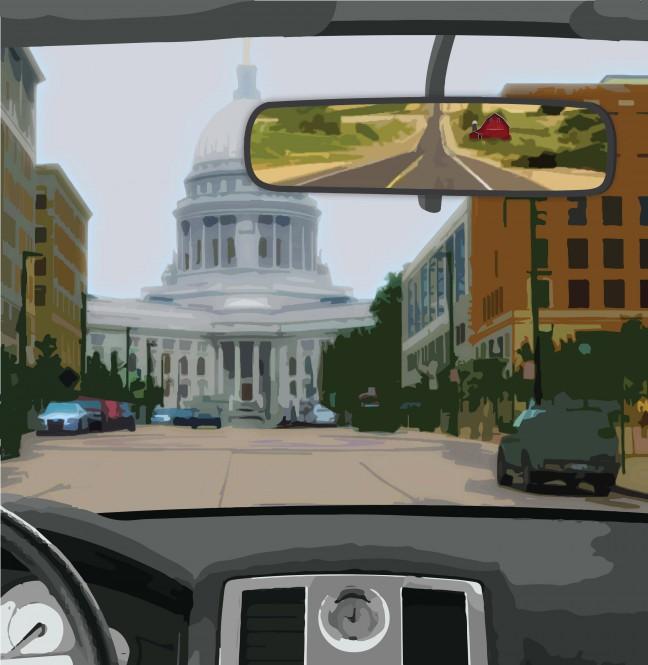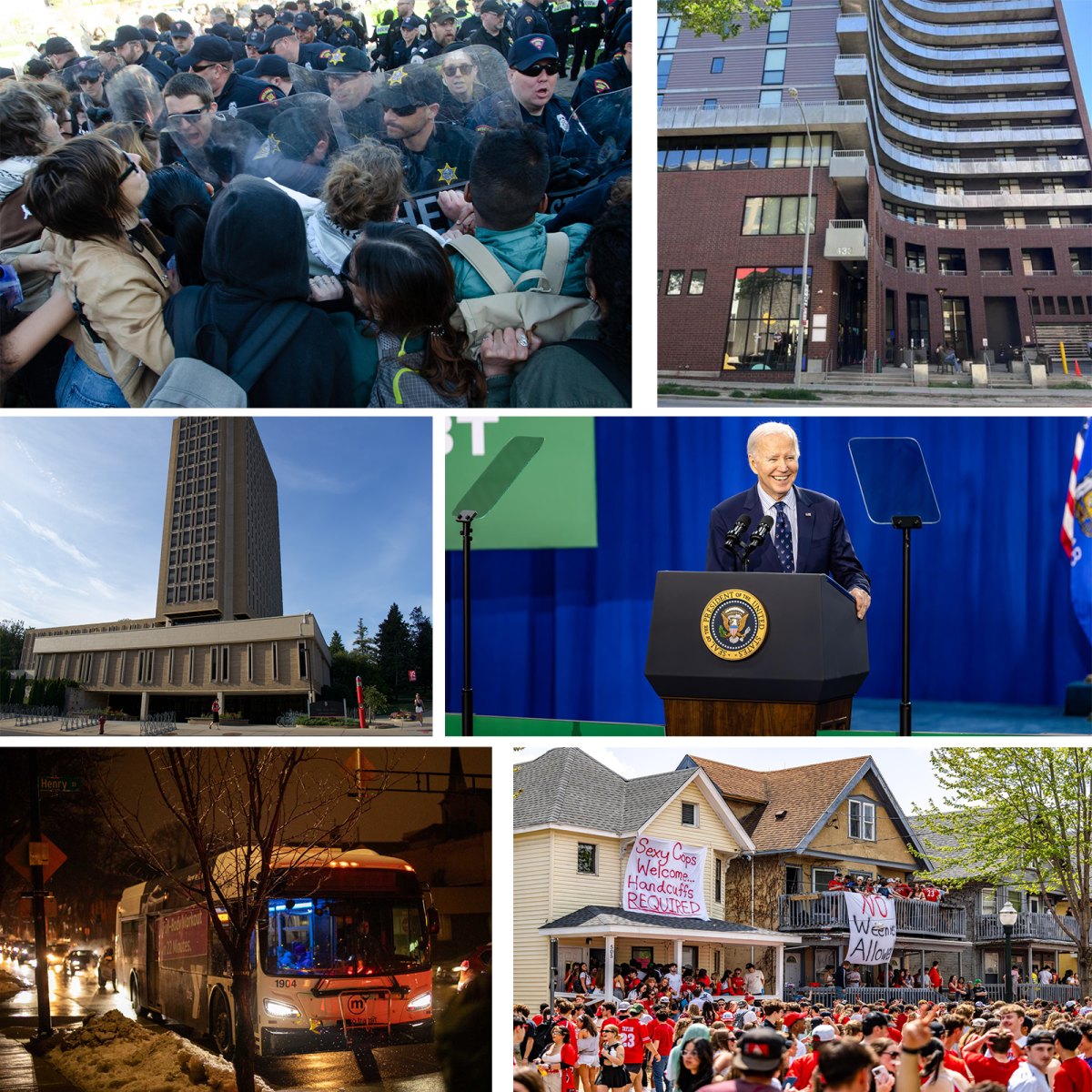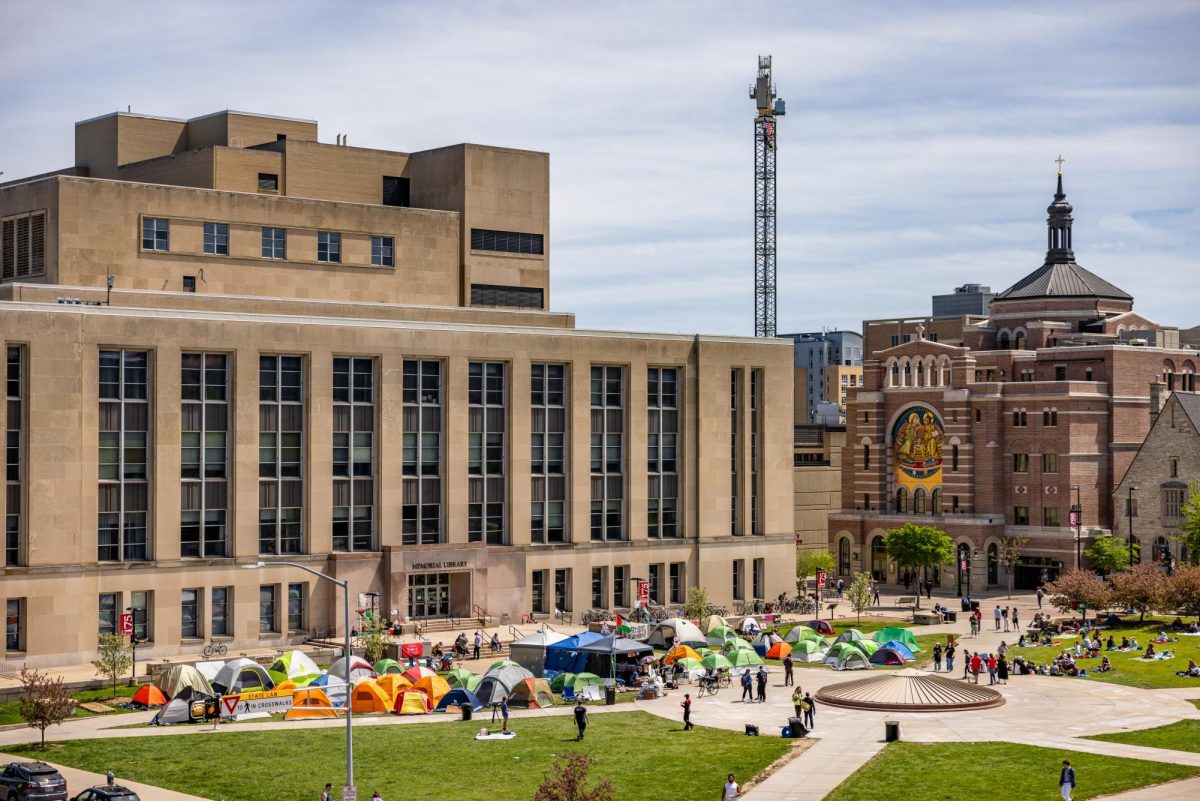In high school, Zach Meyer knew he wanted to apply to University of Wisconsin to pursue his undergraduate degree. It would provide him with the best opportunities to succeed at whatever career path he chose, he said.
Meyer is from Reedsburg, Wisconsin, a rural city 15 minutes west of the Wisconsin Dells. His mother’s family is made up of farmers; his father’s side primarily works in a car factory. Meyer’s graduating class had 200 people, which isn’t as small as some rural Wisconsin schools, but when he got to Madison, he realized some of his peers often had more academic opportunities than he did in high school.
Meyer took three Advanced Placement courses — psychology, biology and physics — but he soon found out many classmates at UW had been able to take much more, and came in with more college credits than he had.
Meyer is currently a second-year medical student at the University of Wisconsin School of Medicine and Public Health. But he’s enrolled in a unique program — the Wisconsin Area for Rural Medicine. WARM trains future physicians to be re-entered into rural areas of Wisconsin once they complete their training. Meyer said he was lucky his parents emphasized the importance of education, otherwise he may have followed his father’s career path.
But not all rural area students come from situations exactly like Meyer’s.
Rural challenges
Currently, 43 percent of K-12 public school students are in rural areas or towns more than 10 miles from urban centers, according to 2014-15 data from the Wisconsin Department of Public Instruction.
Thomas McCarthy, DPI spokesperson, said he doesn’t think rural students are at a disadvantage in getting into schools like UW.
“I think a lot of rural communities are focused on providing the highest quality of education that they can,” McCarthy said.
According to a 2014 map by DPI, students in rural areas of northern Wisconsin are less likely to be enrolled in an AP course than those from southern, more urban parts of the state.

Laure McCloskey is a science teacher in Mellen, Wisconsin at Mellen High School, which serves middle and high school students in far northern Wisconsin. She is the sole science instructor for all 80 high school students grades six through 12.
While she enjoys the challenge, McCloskey said her job presents extra demands. At Mellen, AP courses are only offered online, so McCloskey tries to take materials from AP practice tests and insert them into her higher-level courses.
McCloskey said finances are an issue for many rural high school students. McCloskey used to work in urban New Orleans, and said she sees similar financial struggles between low-income rural and urban families.
When McCloskey posts summer learning opportunities in larger Wisconsin cities on a board in her classroom, she said her students are immediately concerned with the price tag associated with them.
But last summer, McCloskey discovered the Rural Summer Science Camp through the Morgridge Institute for Research, which brings students and teachers from rural areas to UW to teach them about subjects they normally aren’t introduced to in their hometowns.
McCloskey said without the camp, some of her students would not have even applied to UW, but are now enrolled today.

Courtni Kopietz/Morgridge Institute for Research
Learning opportunities
The Rural Summer Science Camp introduces students to stem cell sciences with hands-on learning, something McCloskey said her students never would have been introduced to.
In far northern Wisconsin, students mostly learn about environmental sciences and the outdoors, but rarely do they receive in-depth education about biology and molecular-based sciences, she said.
“You don’t want to just do complete outdoor education,” McCloskey said. “You need to have a balanced approach in science, in any class. You learn how to be something by being exposed to it, so I want to expose the kids to all the different opportunities there are in science.”

Courtni Kopietz/Morgridge Institute for Research
Giving back to rural communities
Through the WARM program, UW trains future physicians to work in rural settings. Byron Crouse, WARM director, said it began in 2007 to address a growing shortage of physicians in rural communities throughout Wisconsin.
The first two years for WARM students are exactly the same as other medical students at UW. But in their third year, they spend clinical training time in either La Crosse, Green Bay or Marshfield to learn specialty skills, and are placed in a rural community for their fourth year for general practice training.
While some students from rural areas may go to college to get away from a small town upbringing, Crouse said the idea of returning to a rural area excites WARM students.
“They don’t see it as the middle of nowhere — they see it as the middle of where they want to be,” Crouse said.
During the admissions process, Crouse said WARM looks at not only a student’s academic record, but whether they are likely to return to a rural area depending on where they grew up, their personal passions and their involvement in their community.
“They don’t see it as the middle of nowhere — they see it as the middle of where they want to be.”
Crouse said practicing medicine in rural areas is unique because students have to be prepared to handle all issues that come their way, rather than focus on a particular field of medicine, as many urban physicians do.
In medical school training, Crouse said the WARM program allows students to be the only student in training at a particular clinic, rather than one in 150.
For Meyer, who wants to be a family physician, the prospect of getting more one-on-one practice in the field is motivating.
“We get a lot more hands on with procedures or just our patients directly, which is awesome,” Meyer said. “That’s kind of what you need to be in a rural community. You need to know a little bit of everything and learn how to improvise, so I find that [hands-on experience] to be extremely valuable.”
Helping students succeed
Vice Provost for Enrollment Management Steve Hahn said in an email to The Badger Herald that the Office of Admissions and Recruitment does not have a specific policy relative to students from rural communities.
“Instead, in line with the university’s commitment to serve our citizens from all corners of the state, we actively recruit, admit through a holistic review and attempt to enroll as many rural students as possible, either at the freshman or transfer point of entry,” Hahn wrote.
But UW offers several opportunities for students of unique backgrounds, including those coming from rural areas.
The LEED Scholars Program within UW’s College of Engineering is a merit-based program that recruits women and minorities.
Assistant Director of Undergraduate Retention for the College of Engineering Brian Nunez said the program is beneficial for students coming from rural areas because they are immediately involved in a community once they set foot on campus.
“The LEED Scholars Program is a living example of the Wisconsin Idea — to take university resources and make sure they reach all parts of the state and country,” Nunez said.
Eric Williams is the interim director of the PEOPLE program and the Center for Educational Opportunity on campus, both of which help low-income or first generation students succeed academically with different advising resources.
Williams said the Center for Educational Opportunity assists students from both rural and urban areas from anywhere in the U.S. in equal parts.
One of the programs within the Center for Educational Opportunity, Student Support Services, recently received a grant specifically for students interested in STEM fields, in order to better tutor and mentor those students, Williams said.
For students who have no expected family contribution, the FASTrack program accepts students solely based off whether they fit into a particular income bracket on their FAFSA application. Currently serving 1,300 students, FASTrack guarantees costs for four years of attendance as long as the student’s financial situation doesn’t change, Joselyn Diaz-Valdes, senior financial aid officer of Office of Student Financial Aid, said.
But she said for the past few years, it’s been difficult to even fill the program. She said FASTrack didn’t even have enough students to fill its spring 2016 limit, a trend that has been present for the past three years.
“What I would love for students who are coming from incomes where they think, ‘My family is never going to be able to afford UW-Madison,’ is that UW-Madison is a possibility,” Diaz-Valdes said. “I would hate for any student to erase UW-Madison because of the financial barrier.”
At the state level, several Republican legislators helped introduce the Rural Wisconsin Initiative in January, designed to persuade Wisconsin workers to stay in rural areas. The bill package includes an expansion of broadband grants, loan repayments for college graduates who relocate to rural areas and new STEM grants for rural schools.
Crouse said he hopes the bills pass through the Legislature.
Returning to rural roots
Meyer did not need to be convinced to return to a rural community after he completes his education. In fact, he wants to return to his hometown Reedsburg to be reunited with his family and his fiance.
In July, Meyer is headed to La Crosse to begin specialty training for his third year of medical school. He is proud of the WARM program and believes it is recruiting the best physicians the state can ask for.
“My fellow WARM students — you just would want them to be your doctor,” Meyer said. “They’re able to step into someone’s shoes and experience what they’re going through. They look at how they can best help them in their health and their lives.”





















